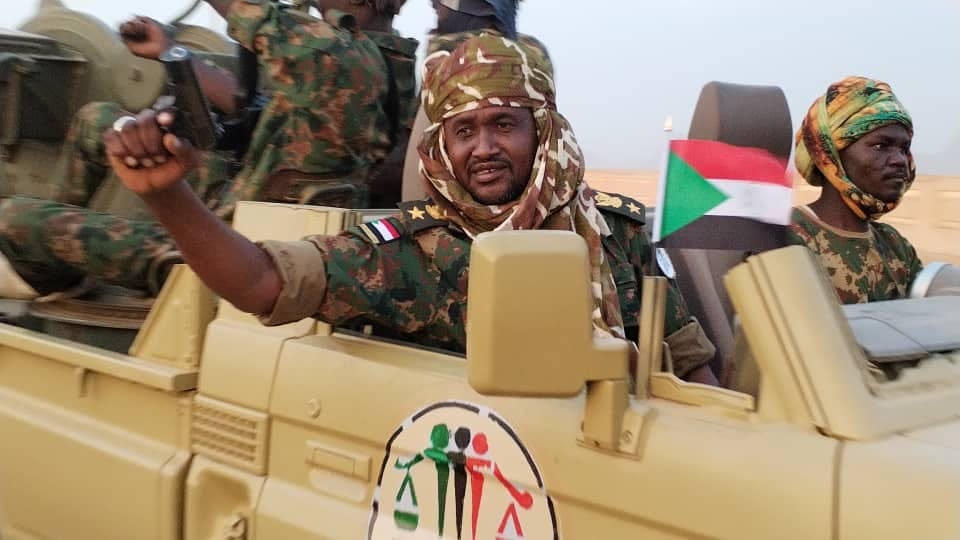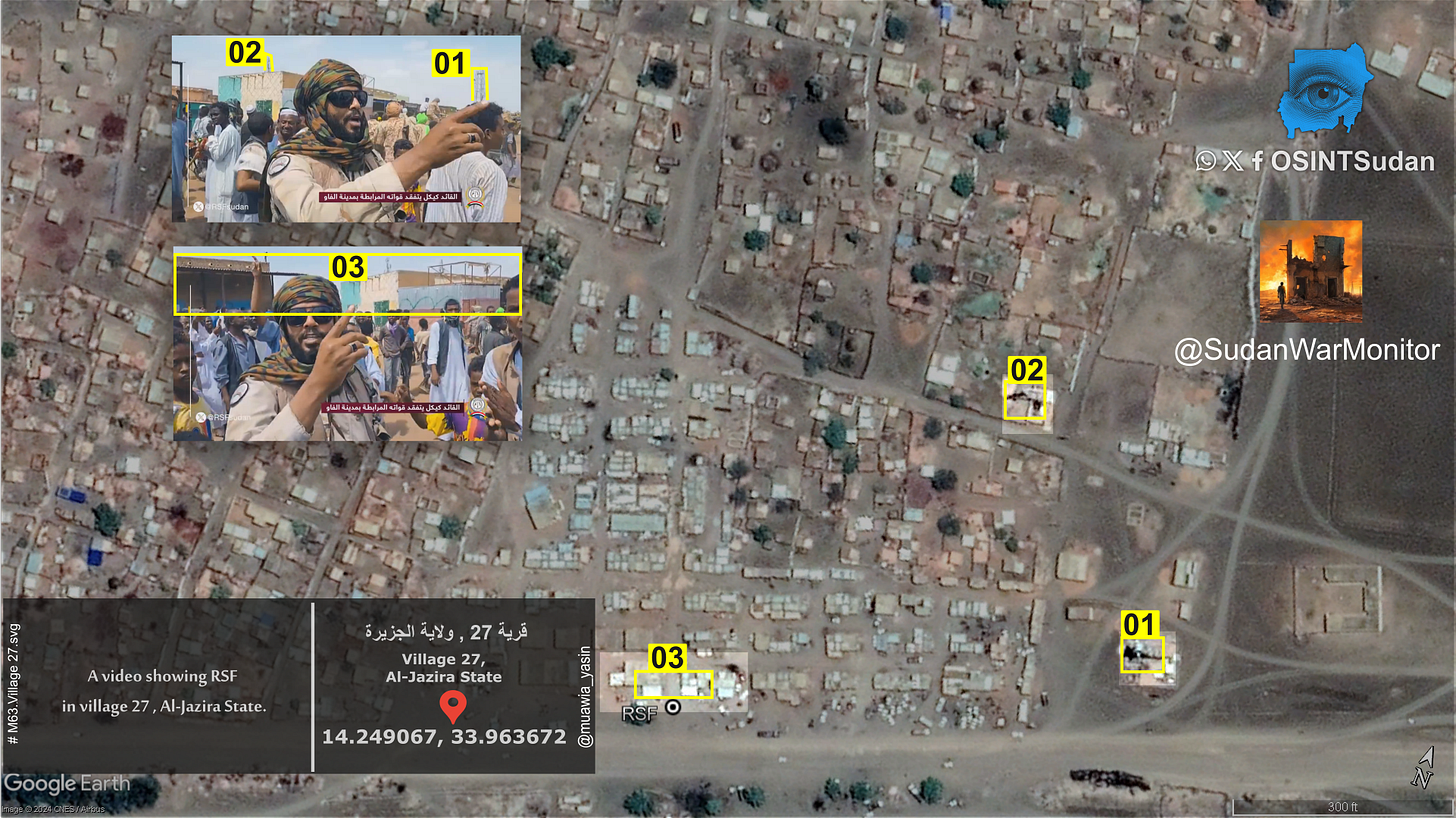JEM to join battle on Gedaref front
Plus: U.S. seeks resumption of peace talks in Jeddah
A large column of Justice and Equality Movement (JEM) troops on Thursday paraded through the outskirts of Kassala, announcing its departure for Al Jazira State.
The force under the command of General Fadl Ishaq Fadl Ushur will head to western Gedaref, where the Sudanese army is building up a massive force to recapture Wad Madani, the capital of Al Jazira. JEM is calling the force the “Martyr Dr Khalil Ibrahim Convoy,” after the movement’s founder, who died in an airstrike in 2011.
The former Sudanese rebel group, which battled the government from 2003-2020, is now fighting side-by-side with its former nemesis, the Sudan Armed Forces (SAF).
JEM has embarked on a massive recruitment drive in eastern Sudan, with the sanction of Sudan’s military junta. The effort has swelled and diversified JEM’s ranks, which formerly consisted mostly of Zaghawa and Arab tribesmen from western Sudan, specifically Darfur and Kordofan.
Hatred of the Rapid Support Forces (RSF), which JEM also battled for many years in Darfur, is a key motivation.
Other factors include financial and political incentives from the Sudanese military junta. JEM’s chairman Jibril Ibrahim currently serves as finance minister in the new de facto capital, Port Sudan, under the terms of the 2020 Juba Peace Agreement (a deal struck to resolve the long-running Darfur conflict that preceded the current civil war).
Ideologically, JEM’s founder Khalil Ibrahim and some of its current leadership share affinities with the former regime, the National Islamic Front, whose cadres are still influential within the Sudanese army and security services. In the 1990s, Khalil was a state-level official in the former Islamist regime, before falling out with it.
A competing faction of JEM, which claims to have ousted Jibril Ibrahim from his chairmanship during a leadership conference in Addis Ababa last year, retains the loyalty of some JEM troops in Darfur, who remain neutral in the conflict.
So far, JEM’s military activities have been limited mostly to training and support operations in Omdurman. But a visit by the Sudanese commander-in-chief to Kassala last month for the graduation of more than a thousand JEM recruits signaled the significance of the former rebel group and its forthcoming deployment to the frontline.
General Abdel Fattah Al-Burhan, the army commander-in-chief and Sudan’s de facto ruler, praised JEM for joining the “battle of dignity” against the RSF. He expressed hopes for the armed group to integrate with the army—but only after the war—citing the example of the SPLM-North faction in Blue Nile, which has integrated its troops.
SPLM-North troops have arrived in Sennar State as part of the 4th Infantry Division. In speeches in Damazin, SPLM-North leaders announced their intention to recapture Wad Madani. JEM, likewise, plans to deploy a battalion to Sennar, in addition to the one moving into Gederef, according to one of the commanders in Kassala.
JEM Brigadier General Fadl Ishaq Ushur said in a video,
“We named this force the Dr. Khalil Ibrahim mobile force group, because Dr. Khalil had a special admiration for Jazira state, he studied in Jazira and married from Jazira as well. As you see nowadays all Jazira citizens are suffering. By God’s permission, your forces here will do their best to liberate Jazira.
“We have 10 battalions, this is the 5th battalion. We have a battalion that will leave to Sennar, other battalions left to Khartoum, Omdurman. There’s another battalion to secure the eastern area. We ensure the people in Kassala that there is a battalion with special trainings to protect the eastern area. We thank Kassala people for their warm welcoming, hospitality, and support from the Kassala government, youth, students, civil society and all other sectors.
“Thank you all of you. We can say that you are safe in Kassala, Gedarif state and all the eastern region. As you see, your forces are ready. As you see, they are well-equipped, and you will see the result very soon.”
RSF at the Gedaref State border
Simultaneously, the RSF have carried out a massive recruitment drive in Al Jazira State, where tens of thousands of farm laborers are out of work. The RSF control as far as the state border with Gedaref, rarely roaming into the neighboring state, where the army control the frontline city of al-Fau.
Below is a video recently published by RSF’s official social media accounts, which falsely claims to have been filmed in “al-Fau city” in Gedaref. In fact, we located this to Village 27 in Al Jazira, a distance of 20 km from al-Fau and 7 km from the state border.
The video shows youth and older boys whom the RSF has recruited, being greeted by the RSF’s top commander in the state, Abu Aqlah Kikel.
If the RSF wish to carry the war into Gedaref State, they will need large supplies of fuel, potentially overstretching their supply lines. Sudan’s army has targeted RSF fuel trucks moving south from Jaili Refinery in Khartoum State, hitting them with drones and ambushes in Bahri, in an effort to limit RSF’s operational mobility.
RSF seem to anticipate that the coming battle on the Jazira/Gedaref front will involve a vanguard of former Darfur rebels, who historically fought using similar equipment and tactics as the RSF, emphasizing mobility and hit-and-run tactics.
RSF’s media office released this video Friday with the caption, “The courageous soldiers of the RSF stand ready to confront the mercenaries of Jibril [Ibrahim], [Minni] Minnawi, and [Mustafa] Tambour to bring an end to the era of al-Burhan militias once and for all.” The video show RSF troops in Al Jazira State.
U.S. seeks restart of ‘formal talks’ after Ramadan
Tom Perriello, the newly appointed U.S. Special Envoy for Sudan, said Thursday that he expects peace talks in Jeddah to resume after Ramadan, the Muslim holy month, which ends April 11. Speaking at a digital press briefing hosted by the U.S. State Department’s London International Media Hub, the envoy referred positively to recent informal talks in Manama and Cairo, but emphasized the need to restart formal talks, which were suspended last November without having achieved any breakthrough.
Perriello said, “We believe that the we have seen several really important efforts across the region. And the role that Saudi Arabia has played in hosting the Jeddah talks, I think, can be an area that brings together pieces that have been emerging in Cairo and in Manama and other places.”
“But we need to restart formal talks. We hope that will happen as soon as Ramadan is over, that those are inclusive talks of key regional actors as well as key voices from the inside, and that we can reach that agreement not just to end the violence but to really open up to full humanitarian access. So we are looking forward to, hopefully, a restart of those talks as soon as Ramadan has ended.”
Perriello was responding to a question from journalist Mohamed Maher from Egypt’s Al-Masry Al-Youm newspaper, who asked, “How does the United States plan to coordinate with global and regional partners to advance peace efforts in Sudan?”
U.S. opposes Iranian intervention
Perriello was also asked by a Kuwaiti journalist about the U.S. State Department’s “assessment of the impact of Iranian presence in the Sudan conflict.” He replied in part, “I think that is something that is of great concern… this is just one example of something that could take an already disastrous situation and be fuel on the fire that helps turn this into even a regional war. “
At the same time, the development has encouraged Arab states to take more action toward mediating a solution to the conflict. Perriello said that the development “increased the political will of leaders in the region to realize this is a crisis we need to come together and work with the Sudanese to solve.”
He referred to the risks of “atrocities, the proximity to famine that we get closer to each day... and also this increased role of external actors. [This is] definitely not the future that the Sudanese people want to see.“
The full briefing is available here. Arabic audio interpretation is available here.
South Sudan retaliates for pipeline rupture
Keep reading with a 7-day free trial
Subscribe to Sudan War Monitor to keep reading this post and get 7 days of free access to the full post archives.



